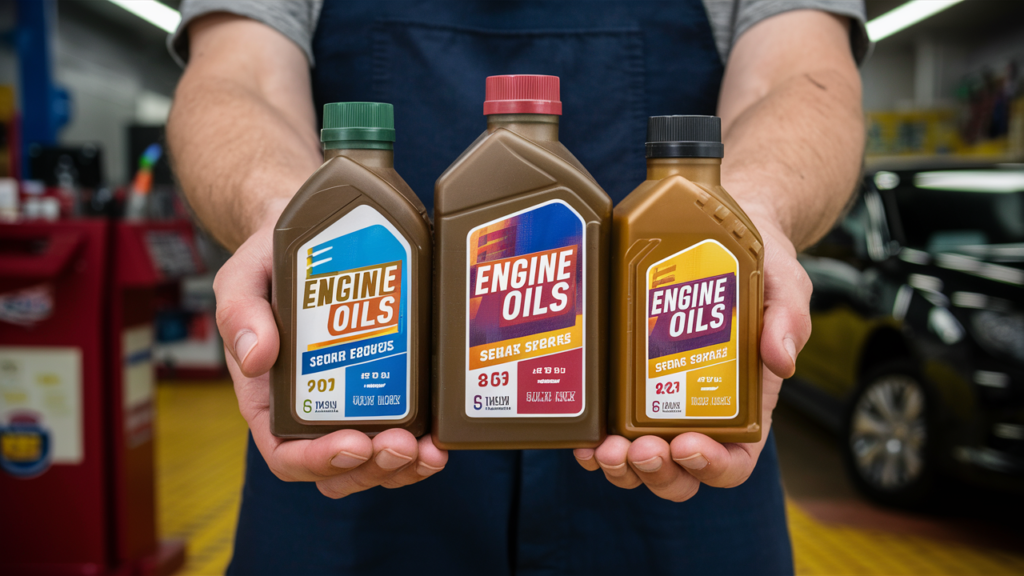
Everything You Need to Know About Car Engine Oil
Car engine oil, also known as motor oil or lubricant, is a vital component for maintaining the proper functioning of a vehicle’s engine. It serves several purposes, including:
- Lubrication: Engine oil reduces friction between moving parts, ensuring smooth operation and reducing wear and tear on the engine components
. Cooling: Engine oil helps to dissipate heat generated by combustion and friction, which is essential for maintaining optimal engine temperatures. Cleaning: Engine oil removes contaminants and debris from the engine, preventing the buildup of sludge and deposits that can decrease performance.
Protection against corrosion: Engine oil contains additives that neutralize corrosive acids produced during combustion, protecting metal engine parts from damage. Sealing: Engine oil forms a protective layer between engine components, enhancing sealing and reducing clearance between moving parts.
There are different types of engine oil available, including:
- Conventional oil: Made from refined crude oil, it is the least expensive option but may not provide adequate protection against extreme temperatures. Synthetic oil: Highly refined and stable under various temperatures, it offers superior performance and protection but is more expensive. Synthetic blend oil: A mix of conventional and synthetic oil, it balances performance and cost. High mileage oil: Designed for older vehicles with high mileage, it helps reduce oil consumption and prevent leaks.
Regular oil changes are crucial to maintain the health and performance of a vehicle’s engine.
In the intricate symphony of vehicle components, car engine oil plays a crucial melody, harmonizing the complex mechanisms to ensure smooth operation and longevity. Engine oil, a specialized lubricant formulated for internal combustion engines, transcends its fluid form to become the lifeblood of the motor.
Its primary purpose lies in reducing friction between moving parts, dissipating heat, and safeguarding against wear and corrosion within the engine. Understanding the fundamental role of engine oil is paramount for those vested in automotive performance – from passionate auto enthusiasts to meticulous engineers seeking peak efficiency.

Delving beyond mere function, this article presents an exhaustive exploration into the realm of car engine oil with unwavering precision and factual clarity. By dissecting various types of engine oils – encompassing conventional, synthetic, and semi-synthetic variations – readers will embark on a journey through the labyrinth of characteristics unique to each variant.
With detailed insights into viscosity grades and additive intricacies that influence engine performance, this comprehensive guide equips individuals with the knowledge necessary to make informed decisions tailored to their specific vehicle requirements. Embark on an educational voyage as we unravel the mysteries cloaking engine oil’s nuances – demystifying myths while propelling readers towards optimal maintenance practices for sustained automotive excellence.
Types of Car Engine Oil.
Car owners often face the dilemma of choosing the right engine oil for their vehicles amongst the three main types available in the market. Conventional oil, derived from crude oil, is the traditional choice. It offers adequate lubrication and heat resistance for standard engines.
On the other hand, synthetic oils are artificially produced to meet higher performance standards, offering better protection against extreme temperatures and engine wear. Semi-synthetic oils blend both conventional and synthetic components, striking a balance between performance and cost-effectiveness.
When considering which type of oil to use, it’s vital to factor in the specific requirements of your vehicle. For high-performance or newer models that demand superior protection and efficiency under varying conditions, synthetic oils are often recommended.
They provide enhanced lubrication properties that can contribute to longer engine life and improved fuel economy. On the flip side, conventional oils remain suitable for older vehicles or those with less demanding needs where cost-effectiveness is a primary concern.
In essence, the choice between conventional, synthetic, or semi-synthetic engine oil should align with your vehicle’s demands regarding performance expectations, driving habits, climate considerations, and manufacturer recommendations.
By understanding the distinctions among these types and their respective benefits, you can optimize your car’s engine performance while ensuring longevity and reliability.
Selecting the appropriate oil type ensures that your engine operates efficiently regardless of operating conditions—from daily commutes in mild climates to rigorous off-road adventures or high-speed highway drives—providing peace of mind for any driving situation ahead.
Viscosity Grades and Their Impact on Engine Performance.
Viscosity grades play a crucial role in the performance of car engine oil. Viscosity refers to the oil’s resistance to flow at different temperatures. The Society of Automotive Engineers (SAE) has developed a standardized system for grading oil viscosity, typically represented as “XW-XX,” where the numbers before and after the ‘W’ indicate the oil’s viscosity in cold and hot conditions, respectively.
For instance, in a 10W-30 engine oil, the “10W” signifies its low-temperature viscosity, while “30” indicates its high-temperature viscosity.
The choice of viscosity grade significantly impacts how effectively an engine runs. Low-viscosity oils like 5W-20 flow more easily at lower temperatures, ensuring quick lubrication during cold starts, thus reducing wear on engine components.

On the other hand, high-viscosity oils such as 15W-40 provide better protection under high temperatures but might not be suitable for cold climates due to decreased flow efficiency. Understanding these differences is vital when selecting an oil grade tailored to specific weather conditions prevalent in your region.
When choosing the right viscosity grade for your vehicle, consider factors such as your typical driving environment’s temperature range and your manufacturer’s recommendations. For example, if you live in a predominantly cold climate, opting for an oil with a lower first number (e.g., 0W or 5W) ensures proper lubrication during frigid mornings.
Conversely, warmer environments would benefit from higher first numbers like 15W or 20W to maintain appropriate viscosity levels at operating temperatures. Selecting an inappropriate viscosity grade can lead to poor lubrication, increased frictional losses, and compromised overall engine efficiency – underscoring the importance of making an informed decision based on your vehicle’s needs correlated with prevailing weather conditions.
Additives in Engine Oil.
Car engine oils are not just simply lubricants; they are complex blends containing various additives crucial for the optimal functioning of your vehicle’s engine. These additives play specific roles aimed at enhancing performance, durability, and efficiency.
Detergents, for instance, work to prevent the buildup of sludge and deposits inside the engine, safeguarding its components from harmful contaminants that could impede its operation. Dispersants, on the other hand, function to suspend impurities within the oil to ensure they do not settle and cause blockages or wear on critical engine parts.
Another category of essential additives found in engine oils is anti-wear agents. These additives create a protective film on metal surfaces within the engine, reducing friction and minimizing wear during operation.
By forming this barrier between moving parts, anti-wear agents help extend the lifespan of vital components like pistons and cylinders. When selecting an appropriate engine oil for your vehicle, it is paramount to check for these key additives to guarantee comprehensive protection against detrimental factors that can compromise engine health over time.
Ensuring your chosen engine oil contains the necessary additives is fundamental in maintaining peak performance levels for your vehicle’s powertrain system. Without these elements present in adequate quantities, your engine could be susceptible to premature wear and reduced efficiency.
Therefore, when perusing different options on the market or consulting with automotive professionals about which oil is best suited for your car, paying attention to the additive composition is pivotal in safeguarding your investment and prolonging the life of your vehicle’s engine.
Changing your car’s engine oil – Why its important.
Changing your car’s engine oil is a crucial maintenance task that significantly impacts the performance and longevity of your vehicle. To guide you through this process, here is a step-by-step overview of changing your car’s engine oil.
First, gather the necessary supplies: new engine oil matching your vehicle’s specifications, an oil filter, a wrench for removing the drain plug, and gloves for protection. Park your car on a level surface to ensure proper drainage and safety during the oil change.
Before starting, warm up your engine slightly to make the draining process more efficient. Then, locate the oil drain plug beneath your car—consult your vehicle’s manual if unsure about its location. Place a catch pan underneath and carefully remove the drain plug using a wrench. Let the old oil flow out completely before reinstalling the drain plug securely.

Regularly changing your engine oil is vital to maintain optimal performance and prolong your vehicle’s lifespan. Experts recommend changing your oil every 5,000 to 7,500 miles or at least once a year. However, if you frequently drive in stop-and-go traffic or harsh conditions, more frequent changes may be necessary to prevent engine damage.
Maintaining a consistent schedule for changing your car’s engine oil based on mileage or time intervals will not only enhance the efficiency of your vehicle but also prevent costly repairs in the future. By following these simple steps and adhering to recommended intervals for oil changes, you can ensure that your car runs smoothly and stays in peak condition for years to come.
Signs Your Car Needs an Oil Change.
Knowing the signs that indicate your vehicle is due for an oil change is crucial for maintaining optimal engine performance. One of the primary indicators is a low oil level, which can be checked using the dipstick. If the oil level is below the recommended mark, it’s time to schedule an oil change to prevent potential damage to your engine components.
Additionally, inspecting the color and consistency of your engine oil is essential. Dark or dirty oil suggests that it has become contaminated with debris and particles over time, losing its lubricating properties. This contamination can lead to increased friction and wear on engine parts, necessitating a timely oil change.
Engine noise can also signify the need for fresh engine oil. If you notice unusual sounds such as knocking or ticking coming from your engine, it may be a sign of inadequate lubrication due to old or degraded oil. These noises are often a precursor to more significant issues if left unaddressed.
Prompt action upon noticing these signs is crucial to avoid costly repairs and ensure the longevity of your vehicle’s engine. Neglecting regular oil changes can result in accelerated wear on critical components like pistons, camshafts, and bearings, leading to decreased performance and efficiency over time.
Ignoring the signs that indicate your car needs an oil change can have detrimental effects on both engine performance and longevity. Without proper lubrication from fresh oil, friction between moving parts increases, causing premature wear and potentially catastrophic damage.
In extreme cases, running an engine with insufficient or degraded oil can lead to overheating and complete engine failure. By staying vigilant for signs like low oil levels, dark or dirty oil, and unusual engine noises, you can proactively maintain your vehicle’s health and performance while extending its lifespan through regular maintenance practices like timely oil changes.
Environmental Impact
The use and disposal of engine oil have significant environmental implications that cannot be overlooked in today’s context of heightened environmental awareness. Improper disposal of engine oil, such as pouring it down drains or on the ground, can lead to contamination of soil and water sources.
Even small quantities of oil can have adverse effects on ecosystems, disrupting wildlife and plant life. To mitigate these impacts, it is crucial to adopt eco-friendly disposal methods that minimize harm to the environment.
One effective way to reduce the environmental impact of used engine oil is through recycling. Recycling used oil not only prevents potential pollution but also conserves resources by reusing a valuable product. Many auto shops and waste management facilities accept used engine oil for recycling purposes.

This process not only reduces the need for virgin oil extraction but also minimizes energy consumption required for refining new oil, thus contributing to overall sustainability efforts.
Furthermore, choosing environmentally conscious oils when purchasing engine oil can make a notable difference in reducing one’s ecological footprint. Opting for oils with eco-friendly certifications or those formulated using sustainable practices shows a commitment to environmental stewardship.
Manufacturers producing oils with biodegradable additives or packaging materials contribute to sustainability goals by prioritizing both performance and planet-conscious practices. By making informed choices about the engine oil utilized in vehicles, individuals can actively participate in preserving the environment for current and future generations while ensuring their vehicles operate efficiently.
Common misconceptions.
Common misconceptions about engine oil often lead to confusion among vehicle owners, creating a need for factual clarification. One prevalent myth is the belief that the color of engine oil indicates its quality. Contrary to popular belief, the color of oil does not necessarily reflect its effectiveness.
Engine oils darken with usage due to contaminants and debris accumulation, indicating that it is doing its job in removing impurities from the engine components. Therefore, individuals should rely on reputable brands and consult their vehicle’s manual for the recommended oil type rather than solely relying on color perception.
Another misconception dispelled by research is the notion that thicker oil is always better than thinner oil. While some may assume that thicker oil offers superior protection, this is not always the case.
The viscosity grade recommended by manufacturers considers various factors such as operating temperatures and tolerances within the engine. Using oil that is too thick can lead to poor lubrication in cold conditions, increasing wear on critical components at startup. It is crucial to adhere to the manufacturer’s guidelines regarding viscosity grades rather than opting for arbitrary choices based on thickness beliefs.
By providing evidence-based information, we aim to empower vehicle owners to make informed decisions when it comes to selecting engine oils. Understanding these debunked myths can prevent costly mistakes and ensure optimal engine performance over time.
Instead of relying on hearsay or outdated beliefs, drivers should prioritize following manufacturer recommendations, conducting regular maintenance checks, and consulting professionals when unsure about suitable oil choices for their specific vehicles.
Educating oneself on accurate knowledge equips individuals with the tools needed to care for their engines efficiently while avoiding unnecessary risks associated with common misconceptions about engine oils.
Conclusion.
In conclusion, optimizing engine performance goes beyond just changing car engine oil; it involves a holistic approach to maintenance. By adhering to practical tips such as closely monitoring oil levels, regularly checking for leaks in the system, and using high-quality filters, vehicle owners can ensure that their engines operate at peak efficiency. These preventive measures not only enhance the lifespan of the engine but also contribute to smoother overall performance.
Understanding the nuances of car engine oil, including types, viscosity grades, additives, and maintenance practices, is paramount for anyone seeking to maintain their vehicle in top condition.
By following these guidelines meticulously and dispelling common myths surrounding engine oil choices, auto enthusiasts, mechanics, engineers, and vehicle owners can make informed decisions that benefit both their vehicles and the environment. Engine oil is indeed the lifeblood of any vehicle’s mechanical heart – treat it with care, follow best practices diligently, and enjoy a well-maintained engine for miles to come.




